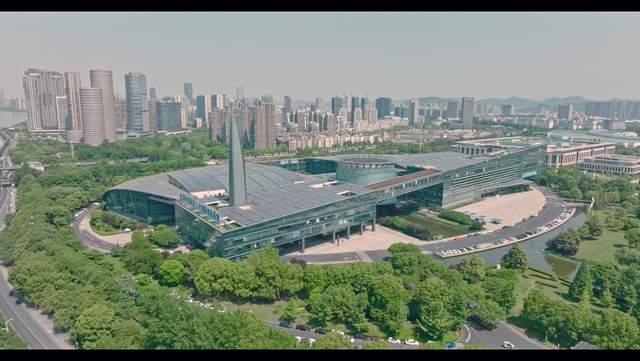Today, the spring breeze of AI in Hangzhou is perhaps the autumn harvest of new productive forces in the future.
In 2024, with the launch of the "Artificial Intelligence +" initiative, the AI development experience of "leading cities" becomes extremely important. Among them, the AI story of Hangzhou may be particularly worth referencing and learning from.
The "14th Five-Year Plan for the Development of the Artificial Intelligence Industry in Hangzhou" clearly states the goal of making Hangzhou a globally influential leading city in artificial intelligence. In July last year, Hangzhou released "Several Measures to Support the High-Quality Development of the Entire AI Industry Chain," proposing 14 specific measures to support AI industry development from five aspects: computing power infrastructure construction, model open ecology, empowering the real economy, whole industry chain development, and talent team support. Notably, it emphasizes tackling computing power technology challenges and building computing power infrastructure as key priorities.
Hangzhou transforms AI computing power into the starting point of the AI industry, empowering AI enterprises through computing power development, flourishing the AI ecosystem, and cultivating AI talent.

To understand this, we can start from the Hangzhou Artificial Intelligence Computing Center and delve into the stories of AI enterprises and entrepreneurs in Hangzhou.
Computing power reflects the spring breeze of AI in Hangzhou.

The story begins in the Hangzhou High-tech Zone (Binjiang). Binjiang District is located on the southern bank of the Qiantang River downstream, adjacent to Xiaoshan District to the southeast and bordering the Qiantang River to the northwest, facing Xihu District and Shangcheng District across the river. People living here have heard the Qiantang tide for thousands of years. Today, AI developers and entrepreneurs in Binjiang hear the echoes of AI computing power by the Qiantang River.
Binjiang District is the core area of Hangzhou's National New Generation Artificial Intelligence Innovation Development Experimental Zone and Innovation Application Pilot Zone. How can we promote the development of the AI industry from the source? The construction of AI computing power is the standard answer given by the times.
Today, pre-trained large models are the mainstream of AI technology. Large models require massive AI computing power as support. Data shows that the demand for AI computing power has increased by more than 150,000 times in the past four years, and the characteristics of large models make enterprises' computing power needs exhibit an elastic feature where the demand for AI computing power is high during training and relatively low during inference deployment. In this case, building a self-owned computing power pool is not cost-effective for the vast majority of enterprises. The adoption of public, inclusive, and intensive AI computing power is becoming the mainstream choice. At the same time, computing power is a new productive force in the digital economy era. It is estimated that for every 1 yuan invested in computing power, it can drive an average economic output of 3 to 4 yuan.
Faced with the significant contradiction between the supply and demand of AI computing power, Binjiang District decided to turn the computing power challenge into a development opportunity for the local AI industry. As early as 2021, Binjiang District launched the Hangzhou Intelligent Computing Center project, becoming Hangzhou's first public service-oriented AI computing power infrastructure. The Hangzhou Intelligent Computing Center also firmly chose an autonomous computing power foundation, using Ascend AI clusters to provide public and inclusive computing power for governments, enterprises, research institutions, and universities. Another construction idea of the center is not only to provide computing power for the industry but also to empower the growth of the AI industry through diverse means, offering services such as AI model training and promotion, application incubation, industry promotion, and talent cultivation to enterprises.
On May 20, 2022, the first phase of the Hangzhou Intelligent Computing Center project was completed, announcing the launch of 40P computing power. As of now, the computing power of the Hangzhou Intelligent Computing Center has been expanded to a scale of 240P. Based on an operation model of one center and four platforms, the Hangzhou Intelligent Computing Center has connected various sectors including government, industry, academia, research, finance, intermediaries, and users, assisting the center in building a commercial closed-loop model and promoting the local computing industry chain aggregation.
At the same time, by the end of 2022, AI large models attracted global attention, leading to a new round of AI industry explosion. The Hangzhou Intelligent Computing Center was already in operation, fully meeting the development needs of local AI enterprises.
The intelligent tide echoing by the Qiantang River demonstrates the accuracy and foresight of the "Binjiang Strategy."

The aggregation of a new emerging industrial chain requires the right timing, location, and human factors. This is also true for the development of the AI industry in Hangzhou. First, regarding timing, AI computing power is a necessity for the new round of technological revolution, and it is the first hurdle that all AI enterprises cannot bypass.
When the wave of large models rises, and when the AI industry and AI enterprises most need AI computing power, providing abundant and inclusive AI computing power is the responsibility of the Hangzhou Intelligent Computing Center. Especially for large models with massive parameters, providing large-scale AI computing power is the first challenge for the center. In the story of Real Intelligence, we can see how the Hangzhou Intelligent Computing Center accomplishes this task.
Real Intelligence is a leading enterprise in the field of intelligent agents and RPA, a national-level specialized and innovative small giant enterprise, a recipient of the National Excellent Patent Award, a provincial-level high-tech R&D center, and has been recognized as an AI quasi-unicorn enterprise for four consecutive years. It is committed to providing digital employee solutions for enterprises and governments, accelerating digital transformation, and helping clients achieve leapfrog growth. The TARS series large models developed by Real Intelligence are the core support of the company in the AI field.
In Real Intelligence's plan, the strongest version of the TARS model will reach 70B, which is also a very large model parameter in the global AI industry. To achieve this, Real Intelligence needs to obtain 120P of AI computing power. However, the company found that at that time, high-end AI computing power hardware on the market was very tight, and the overall price was highly speculative, leading to significant cost pressure.
At this time, the emergence of the Hangzhou Intelligent Computing Center solved the critical problem. After understanding and communicating, Real Intelligence learned that the computing center had 150P of computing power, which just met the large-scale computing power demand for training the large model. Therefore, after careful consideration and a series of technical preparations, Real Intelligence ultimately completed the training of the 70B large model in just two months using the public computing power provided by the Hangzhou Intelligent Computing Center.
In fact, for AI startups like Real Intelligence, abandoning previous technical routes and choosing the autonomous AI foundation represented by the Hangzhou Intelligent Computing Center requires courage. Will the model be trained successfully? Will the final training effect meet expectations? Are the time and labor costs invested appropriate? These cost-effectiveness questions are what all AI enterprises need to face.
Fortunately, during this period, the Hangzhou Intelligent Computing Center did a lot of work, helping Real Intelligence resolve related doubts through extensive technical communication and Q&A. At the same time, these repeated communications and discussions also allowed the enterprise to see the sincerity from the emerging intelligent computing ecosystem, ultimately making them feel unable to refuse.
Sun Linjun, Chairman of Real Intelligence, stated that the company's previous large models were completed using traditional AI computing power architecture, and migrating to a new technology stack and underlying framework required significant changes, which raised some concerns among algorithm engineers. However, after careful evaluation, they felt it was worth pursuing, as it would greatly improve controllability in the future. Taking this step also validated their previous assumptions. It seemed to have a threshold, but in reality, it was quite worthwhile.
It is worth mentioning that in the cooperation with the Hangzhou Intelligent Computing Center, Real Intelligence not only effectively solved the computing power problem but also saw the determination and potential of Binjiang to develop the AI industry, leading them to choose to establish a subsidiary in Binjiang. In this process, according to documents such as "Several Policies to Promote the Innovative Development of a New Generation of Artificial Intelligence and Promote Industrial Ecosystem Construction" (Hangao Xin [2023] No. 5), Real Intelligence enjoyed various industry supports such as case-by-case discussions, tax reductions, and talent policies. This not only helped the enterprise reduce core AI computing power costs but also provided a long-term path for joint development with the local AI industry.
As of September 2024, the Hangzhou Intelligent Computing Center has completed research on over 800 universities, enterprises, and research institutions this year, with research demands exceeding 5000P, providing inclusive computing power services to 190 enterprises and institutions, empowering ten major industries including smart IoT, smart finance, smart healthcare, intelligent manufacturing, and enterprise services.
The Hangzhou Intelligent Computing Center is beginning to become a focal point, continuously expanding the extension of Hangzhou's AI industry and ecosystem, drawing a larger circle.

The aggregation and development of emerging industrial clusters cannot be separated from the comprehensive influence of local policies, economy, business environment, and cultural atmosphere. These factors collectively define the geographical advantages of the industrial ecosystem from multiple dimensions. To promote the comprehensive growth of the AI industry in Hangzhou, the Hangzhou Intelligent Computing Center cannot merely provide AI computing power; it needs to offer supporting services from multiple dimensions, expanding the AI implementation radius in specific fields together with enterprises and growing the AI cake together.
In this regard, Quanzhen Medical has a clear perception.
Hangzhou Quanzhen Medical Technology Co., Ltd. is a national high-tech enterprise focused on AI medical artificial intelligence products and information technology services. The AI medical assistant developed by Quanzhen Medical, based on large language models, is currently the first medical AI product created in China and the only company to launch an AI medical assistant product in nearly a hundred large comprehensive tertiary hospitals.
In clinical medical scenarios, there have always been challenges such as complex patient treatment processes, excessive time spent by doctors writing medical records, and difficulties in subsequent follow-ups. The implementation of large models in the medical field can assist with patient guidance, medical record writing, remote consultations, and other medical tasks, playing a key role in improving medical efficiency. Therefore, Quanzhen Medical seized this opportunity to become one of the first companies in China to implement large model technology in clinical medical scenarios.
In this process, Quanzhen Medical discovered that hospitals have common needs in their digital transformation process, strongly hoping to choose an autonomous AI computing power foundation, whether opting for public cloud services or building a local digital system. This is crucial for the long-term development of digitalization in the medical industry and aligns with the trend of technological self-reliance and self-improvement.
Hospitals have demands for computing power and intelligent services, Quanzhen Medical has AI capabilities, and the Hangzhou Intelligent Computing Center has computing power, creating a complementary relationship among the three parties on multiple levels. Based on this, Quanzhen Medical and the Intelligent Computing Center engaged in diverse ecological cooperation. Thus, the collaboration between Quanzhen Medical and the Intelligent Computing Center achieved mutual benefits in customer relations and ecological win-win outcomes. The partnership with the Intelligent Computing Center became a strong boost for Quanzhen Medical to expand its market. Quanzhen Medical's exploration in the medical field also brought the value and influence of the Intelligent Computing Center into the healthcare industry. Under multi-party cooperation, autonomous AI computing power and AI large models deeply rooted in medical scenarios, broadening the industrial radius.
As more enterprises achieve sufficient communication, cooperation, and industrial chain synergy under the comprehensive empowerment of the Hangzhou Intelligent Computing Center, AI will transform from a technological opportunity into a true industrial ecosystem, and autonomous AI computing power can take root in more vertical industries.

The competition in the development of all AI technologies ultimately boils down to a contest of talent. The ability to cultivate and support talent, the "human factor," is also a core pillar for the long-term development of the AI industry ecosystem.
To this end, Hangzhou has released policies such as the "Notice on Supporting the High-Quality Development of the Entire AI Industry Chain," emphasizing the autonomous cultivation of composite AI talent. The development and growth of the Hangzhou Intelligent Computing Center also witness the growth of talent related to the autonomous AI ecosystem. Wang Chao, the founder of Kuangwei Juru Technology, can be regarded as a representative of composite AI talent in Hangzhou.
Hangzhou Kuangwei Juru Technology Co., Ltd. is an industry-leading AIoT development platform and hardware-software solution provider, focusing on creating a comprehensive AIoT service system that integrates data collection, computing control devices, and access platforms. Its MegaFlow is a full-stack development cloud platform for the AIoT industry, covering the entire process of AIoT application development through a no-code, modular approach.
Wang Chao, the founder and CEO, is a firsthand participant in the Hangzhou AI industry and the Ascend ecosystem. From his undergraduate studies to his PhD, he chose high-performance computing as his research direction and has been very focused on topics related to computing autonomy. Since 2018, he has been paying attention to the Ascend ecosystem. At that time, he was with his lab peers and can be considered one of the first developers to complete the migration to Ascend.
Over the years, Wang Chao has consistently been an Ascend developer, creating numerous related applications. In 2022, he won the gold medal at the first Ascend Innovation Competition.
Such experiences naturally led him to choose the Ascend direction when embarking on his entrepreneurial journey, and he consequently became involved in the Hangzhou Intelligent Computing Center, which is based on Ascend. From the establishment meeting in 2021 to its official launch in 2023, Wang Chao and Kuangwei Juru witnessed every growth phase of the Intelligent Computing Center and naturally became users of its computing power and builders of its ecosystem.
In Wang Chao's words, Kuangwei Juru and the Intelligent Computing Center have a childhood friendship. He has witnessed the growth of the Intelligent Computing Center and the Ascend ecosystem, and the center has supported his entrepreneurial project from 0 to 1.
The deep-seated core of Hangzhou's "autonomous cultivation of composite AI talent" is vividly illustrated in Wang Chao's story.
From this, we can see that the growth of the Ascend ecosystem, the local AI industry in Hangzhou, and the new generation of composite AI talent are highly synchronized: a future-oriented and potential-driven endeavor will attract talent to join and move forward together, and their creativity and contributions will, in turn, accelerate the growth and maturity of the AI industry and AI talent cultivation system.
Currently, the Hangzhou Intelligent Computing Center has hosted multiple competitions and talent cultivation activities. In October 2024, the Zhejiang Kunpeng Ascend Industry and Talent Innovation Forum and the Kunpeng & Ascend Innovation Competition 2024 Zhejiang Finals Award Ceremony were held in Hangzhou, becoming an important platform for AI talent to understand the Ascend ecosystem and seize AI opportunities.
In March 2024, the Hangzhou Intelligent Computing Center held the 2024 Ascend AI Golden Seed Training Class - Entering the Pan-Internet Industry (Hangzhou Station); in October 2024, it hosted the "2024 Ascend CANN Technology Tour - Operator Development Special Session (Zhejiang University of Technology Station)." These activities provided crucial support for cultivating local composite AI talent.
Today, Wang Chao encourages his classmates and colleagues to actively use Ascend and connect with the Ascend ecosystem. The talent flower of the Ascend ecosystem is currently blooming vigorously.

From the stories of these firsthand participants, we can summarize the multiple values brought by the Hangzhou Intelligent Computing Center:
For enterprises, the Intelligent Computing Center can solve problems and bring development. The demonstration effect exhibited by the center makes AI enterprises realize that it can help them reduce cost burdens and gain diverse support, thus making them willing to choose the Intelligent Computing Center and the city of Hangzhou.
Furthermore, for the Hangzhou AI ecosystem, the Intelligent Computing Center can become a stage and a link. It connects Hangzhou's AI enterprises with clients through activities, exhibitions, competitions, and other forms, forming a prosperous industrial circle, making Hangzhou's AI industry a source and gathering place for new productive forces.
Moreover, for technological self-reliance and self-improvement, the Intelligent Computing Center can become a spark and a lighthouse. Enterprises can step into the door of the autonomous AI ecosystem through the platform of the Intelligent Computing Center, thereby anchoring the direction for technological self-reliance and self-improvement in the AI era and accumulating strength.
Wang Chao said that for AI application enterprises, computing power is the foundation of everything.
The Hangzhou AI industry, based on and starting from the Intelligent Computing Center, has chosen a development path that is solid in foundation, active in operation, and significant in demonstration effect.
Today, the spring breeze of AI in Hangzhou may very well be the autumn harvest of new productive forces in the future.
免责声明:本文章仅代表作者个人观点,不代表本平台的立场和观点。本文章仅供信息分享,不构成对任何人的任何投资建议。用户与作者之间的任何争议,与本平台无关。如网页中刊载的文章或图片涉及侵权,请提供相关的权利证明和身份证明发送邮件到support@aicoin.com,本平台相关工作人员将会进行核查。




